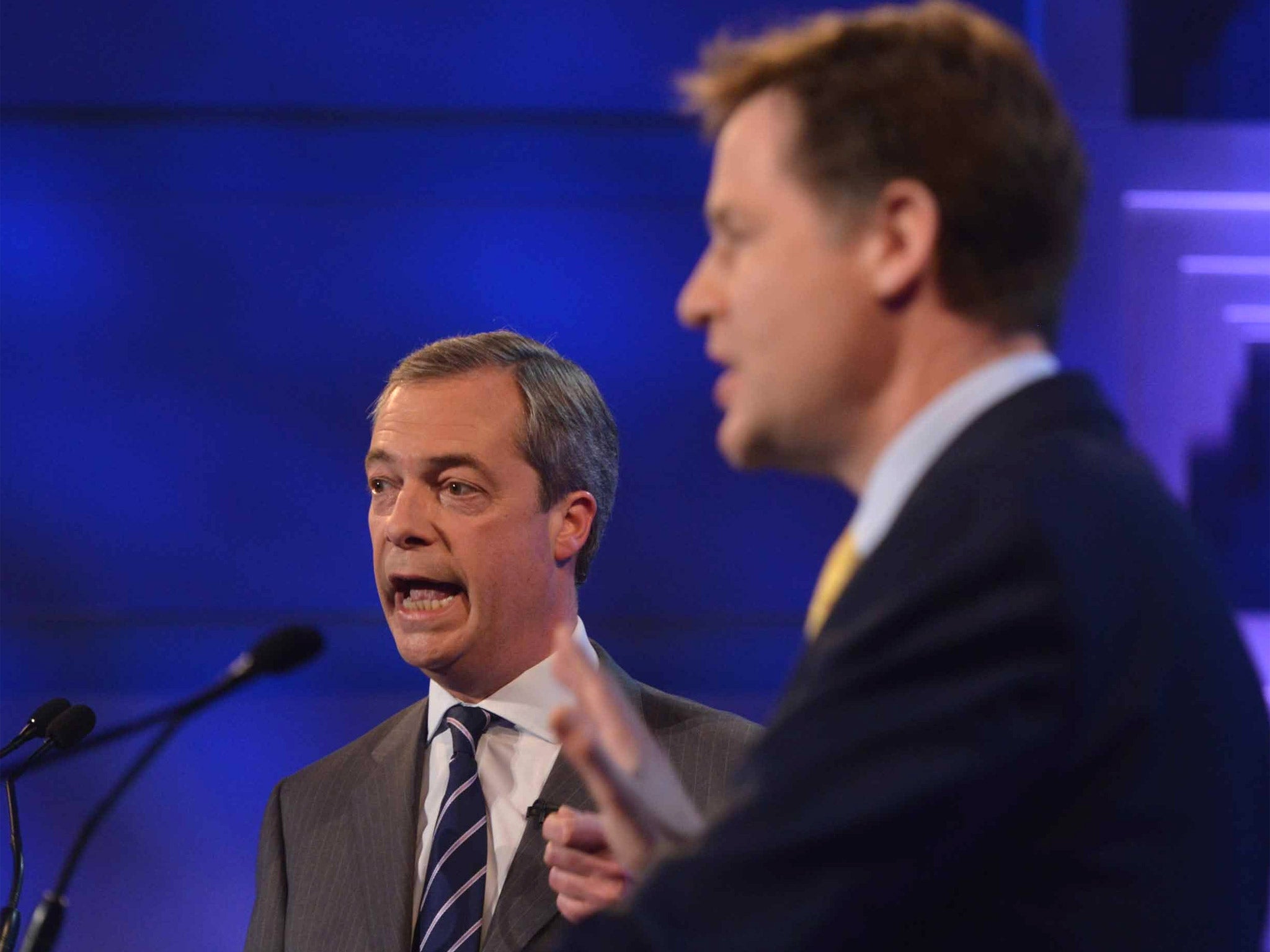Nick Clegg and Nigel Farage, second live debate: Ukip leader tops poll after Clegg's aggressive strategy backfires spectacularly
Polls show Ukip leader is overwhelming winner in showdown on the EU

Nick Clegg branded Nigel Farage the “friend of Vladimir Putin” amid acrimonious clashes between the two leaders in the second of their live broadcast debates.
But the Liberal Democrat leader's change of strategy appeared not to win over the public. Two snap opinion polls after the hour-long debate gave the UK Independence Party leader victory by a bigger margin than he enjoyed after last week's debate.
An ICM poll for The Guardian found that 69 per cent of people thought Mr Farage performed better, with 31 per cent opting for Mr Clegg. A YouGov survey for The Sun gave Mr Farage victory by a margin of 68 to 27 per cent, with one in three Lib Dem supporters saying Mr Farage had won. Last week, YouGov gave the Ukip leader a win by 57 to 36 per cent.
In a more highly-charged debate than their first clash, Mr Clegg showed more passion while Mr Farage appeared more composed than in last week's showdown.
However, the Ukip leader warned dramatically that the EU could break up amid violence on the streets if member states "trapped" in the eurozone did not decide to leave democratically.
"I want it [the EU] to end democratically. I am afraid it will end very unpleasantly," Mr Farage said. He pointed to a rise in support for a neo-Nazi party in Greece and violence in Madrid and Athens. "If you take away from people their ability through the ballot box to change, because they have given away control of everything to someone else, then I am afraid they tend to resort to other means," he said. He appealed to voters to "join the people's army" and "topple the establishment."
The fiercest exchanges came when Mr Farage defended his controversial claim that the EU had triggered the crisis in Ukraine, which led to the annexation of Crimea by Russia.
He argued that the EU's "expansionist foreign policy" had been responsible for the toppling of a democratically elected leader.
Mr Clegg told him: "Listening to that answer, if I'm leader of 'in' [the EU], then Nigel Farage is the leader of Putin. It is extraordinary that his loathing of the European Union is so all-consuming that he is seeking to justify and defend the actions of [Vladimir Putin]."
Mr Farage retorted that the Deputy Prime Minister had been happy to bomb Libya in 2011 and had been "absolutely hell-bent" on joining military action in Syria.
"The British people have had enough of endless foreign military interventions," he declared to applause. "I don't admire Putin. What I said was he had out-witted and outclassed you all over Syria."
He insisted that the Russian President's claim that the sarin gas used in Syria had "not necessarily come from the Assad regime" had been crucial in last year's Commons vote opposing military intervention.
But the Lib Dem leader claimed: "Nigel Farage doesn't want to work with the Americans, to work with the EU, he only wants to work with Vladimir Putin."
Some commentators judged that Mr Clegg won the war of words on foreign affairs, but that Mr Farage had the upper hand on domestic issues.
The debate turned highly personal as the two leaders accused each other of lying over how many British laws are made in Brussels.
In another heated exchange over the impact of migration from EU countries on British jobs and public services, Mr Farage said the scale of immigration over recent years had "shocked" the country and increased segregation in towns and cities. He added: "It has left... the white working class effectively as an underclass, and I think that is a disaster for our society."
Mr Clegg accused Ukip of trying to "turn the clock back" to the 19th century, citing its opposition to gay marriage, women's rights and action to tackle climate change. The Deputy Prime Minister said he believed and loved modern Britain as it is today, rejecting Ukip's "dangerous fantasies about a world that no longer exists."
Join our commenting forum
Join thought-provoking conversations, follow other Independent readers and see their replies
Comments
Bookmark popover
Removed from bookmarks